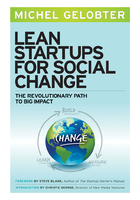
Change in Change Itself
The lean startup is radically more efficient than the old approach of driving human and financial resources into an elaborate but unproven plan. While it does not guarantee success, it accelerates the process of generating new understanding. For the business world, the lean startup holds the promise of being more revolutionary for the world than the emergence of industrial innovation in the 19th century. Where Frederick Taylor, Henry Ford, and others revolutionized production through rigorous study of industrial and human processes, the lean startup brings a radical new science to meeting the demand for products and services itself. In other words, the lean startup is designed, from the bottom up, to find the quickest, most efficient way of meeting a need.
What makes the lean startup possible are two fundamentally new capabilities that have emerged over the last two decades. First, it is possible faster than ever before to know the impact of a change you are seeking to make. Whether it’s a change in people’s behavior, their attitudes, or where they go day to day, or a change in the physical world, the instantaneous and ubiquitous connections that technology has enabled make it increasingly simple to know if that change is happening, and how. There is no single other factor that underlies lean startups more than this ability.
A secondary new factor is our ability to make small batches of almost anything faster than ever before. On the Web, in virtual space, we can test messages and product or service ideas in a matter of minutes by throwing up a webpage or buying click-words that magically appear in the lives of our target audiences. In the physical world, cheap, sophisticated product prototyping has been available for more than a decade in local markets or, with quick shipping, in emerging industrial nations like China and India.
This ability to quickly float a concept or a few samples of a physical product, when coupled with the ability to gauge its impact on people or the environment, almost instantly changes a whole lot about how we can conceptualize new products, services, and relationships and how we can scale them for maximum impact.
New products, services, relationships, scaled for maximum impact: the business sector is not alone in wanting these things. They are the lifeblood of progress in the social sector as well.